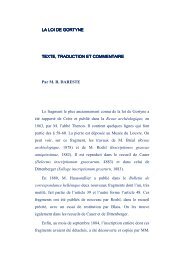CYPRIOT GRAMMAR
CYPRIOT GRAMMAR
CYPRIOT GRAMMAR
You also want an ePaper? Increase the reach of your titles
YUMPU automatically turns print PDFs into web optimized ePapers that Google loves.
Chapter 44: The Gerund, the Past Participle and Reported<br />
Speech<br />
44.1 The Gerund –Το Γερούντιον<br />
The Gerund is a specific type of a verb which signals an on going action. It can also be used as an adverb like the ones in Chapter 43 and<br />
in addition it can also be used to refer to an action theoretically and hypothetically. Gerunds are widely used in English but are not that<br />
common in Cypriot. Examples are: I’m sitting at the desk studying, By studying I will be smarter. He is running around prancing. It is<br />
important to note that contrary to English the Gerund in Cypriot is not used in the form of a noun.<br />
44.2 Producing the Gerund – Παράγοντας το Γερούντιον<br />
Producing the Gerund in English involves taking a verb and adding the suffix –ing. In Cypriot the procedure is just as simple.<br />
1 st Category<br />
Verb -> Drop the –ω -> Add -οντα<br />
Φέρειπειν<br />
Δέρνω -> Δέρν -> Δέρνοντα<br />
Αλλάσσω -> Αλλάσς -> Αλλάσσοντα<br />
Γυρεύκω -> Γυρεύκ -> Γυρεύκοντα<br />
2 nd Category<br />
Verb -> Drop the –ώ -> Add –ώντα<br />
Φέρειπειν<br />
Φακκώ -> Φακκ -> Φακκώντα<br />
Βουρώ -> Βουρ -> Βουρώντα<br />
Ασκοπώ -> Ασκοπ -> Ασκοπώντα<br />
Like in English the Gerund is NOT conjugated.<br />
Φέρειπειν<br />
Εγιώ κάθουμαι τρώοντα<br />
Εσού κάθεσαι τρώοντα<br />
Τούτος/τούτη/τούτον κάθεται τρώοντα<br />
Εμείς καθούμαστιν τρώοντα<br />
Εσείς καθούσαστιν τρώοντα<br />
Τούτοι/τούτες/τούτα κάθουνται τρώοντας<br />
For Verbs in the Passive Voice and for Impersonal verbs you cannot have any Gerund. For Passive Verbs it can be done periphrastically by<br />
turning the verb from the passive voice into the active and adding the personal pronouns according to the case the verb takes.<br />
Φέρειπειν<br />
Δέρνουμαι -> Δέρνω -> Δέρνοντα με<br />
Χαλγιούμαι -> Χαλώ -> Χαλώντα με<br />
44.3 The Past Participle – Η Μετοσ’ή<br />
The Past Participle refers to the form of the verb in the Present Perfect which can also be used as a noun. For example:<br />
Beat -> beaten<br />
Sick -> sickened<br />
Sit -> sat<br />
Clean -> cleaned<br />
If you use these forms with the auxuliary verb of the Present Perfect, ‘to have’, they the function as verbs.<br />
I have beaten<br />
I have sickened<br />
I have sat<br />
I have cleaned.<br />
However these forms can also be used as adjectives if used with the verb ‘to be’. Therefore:<br />
I am/was beaten<br />
I am/was sickened<br />
I am/was sat<br />
163





